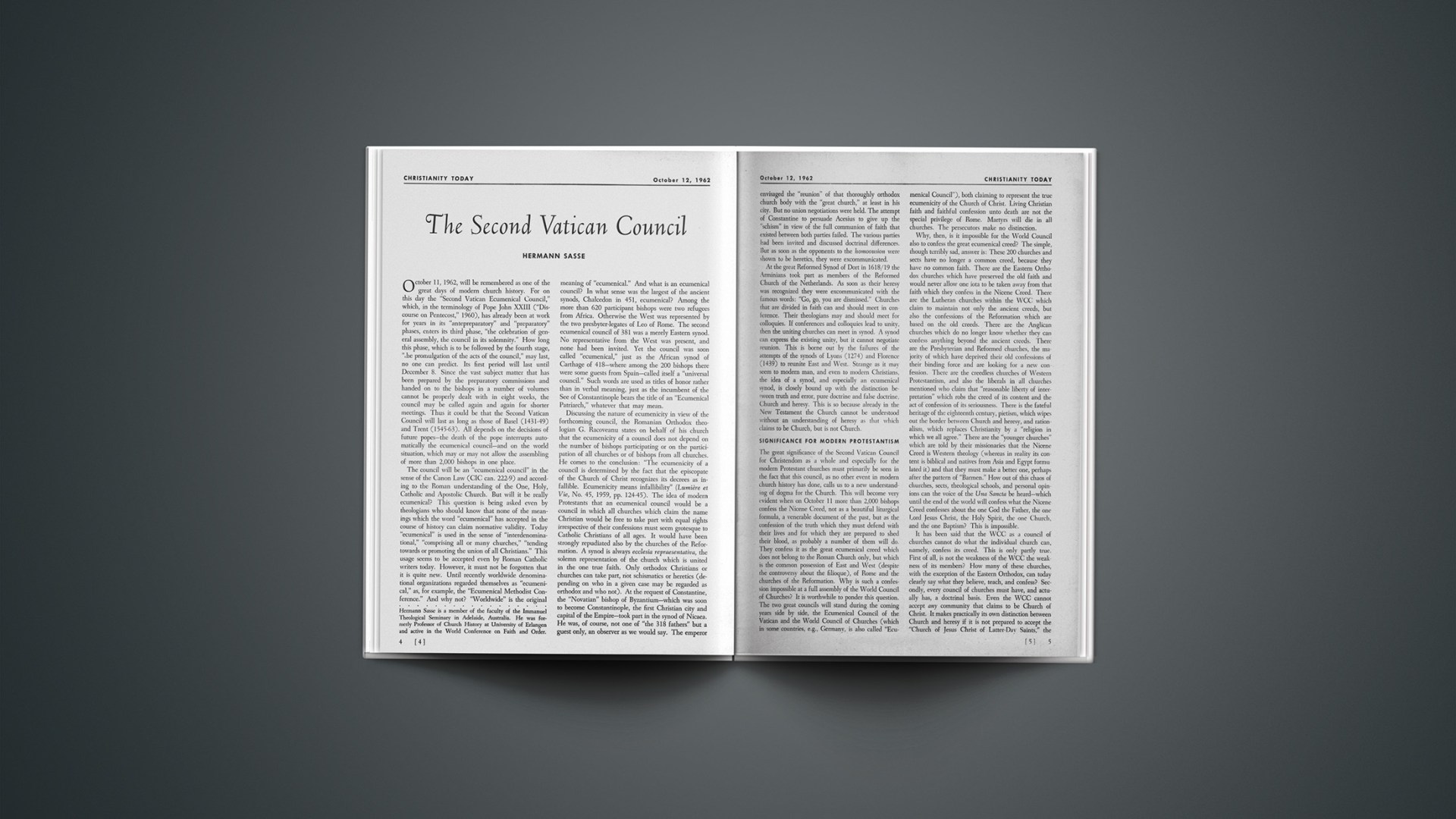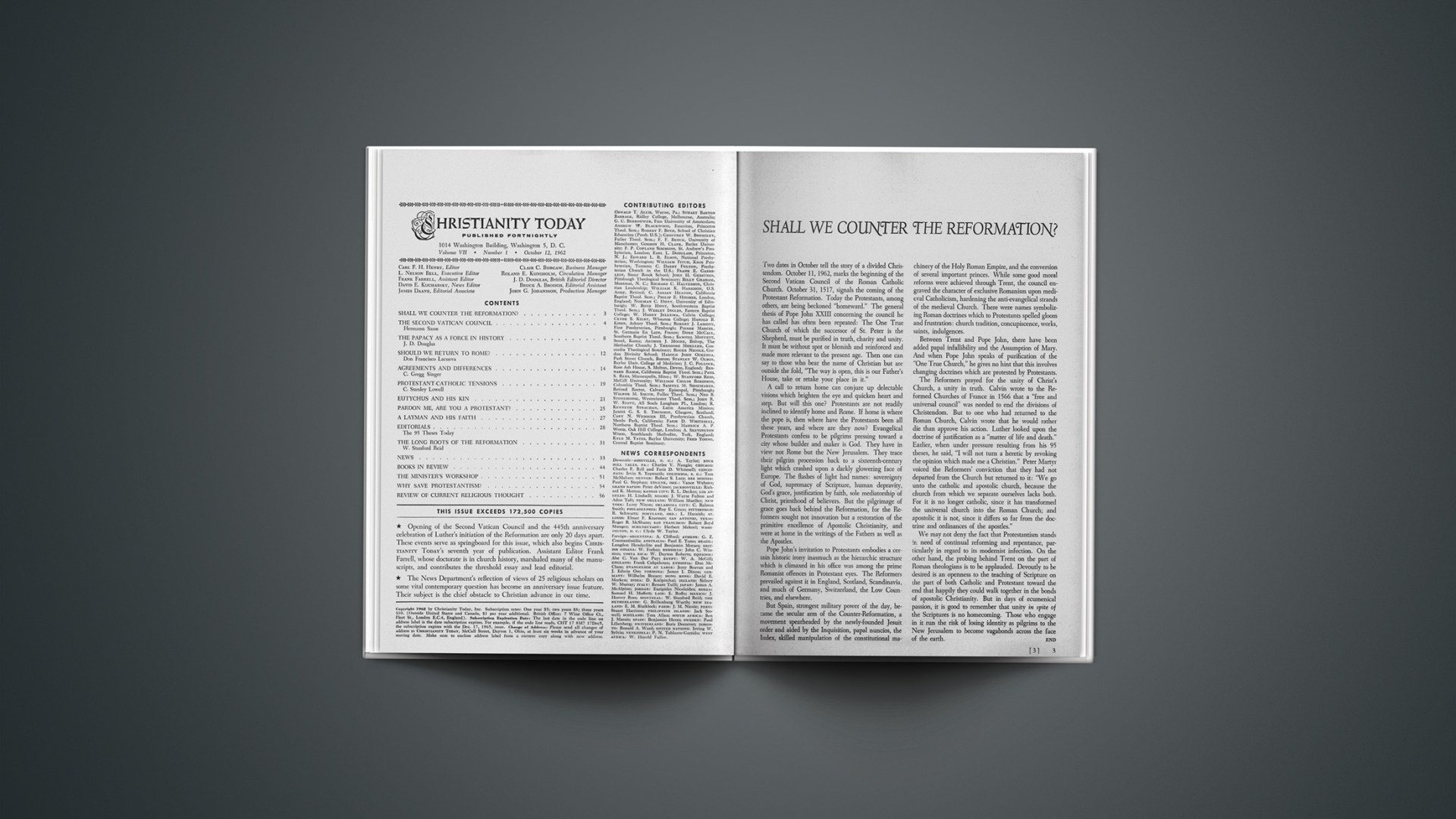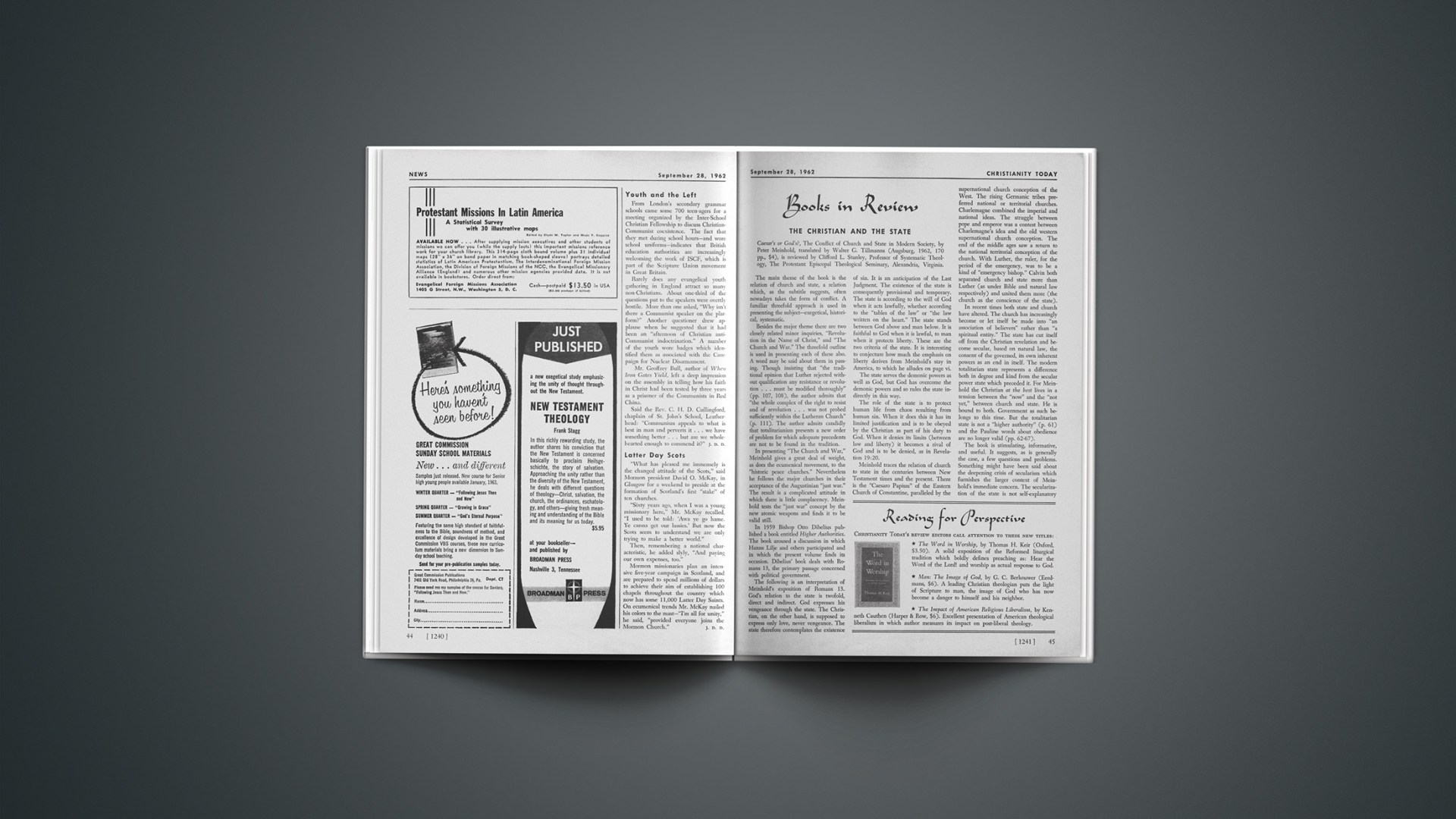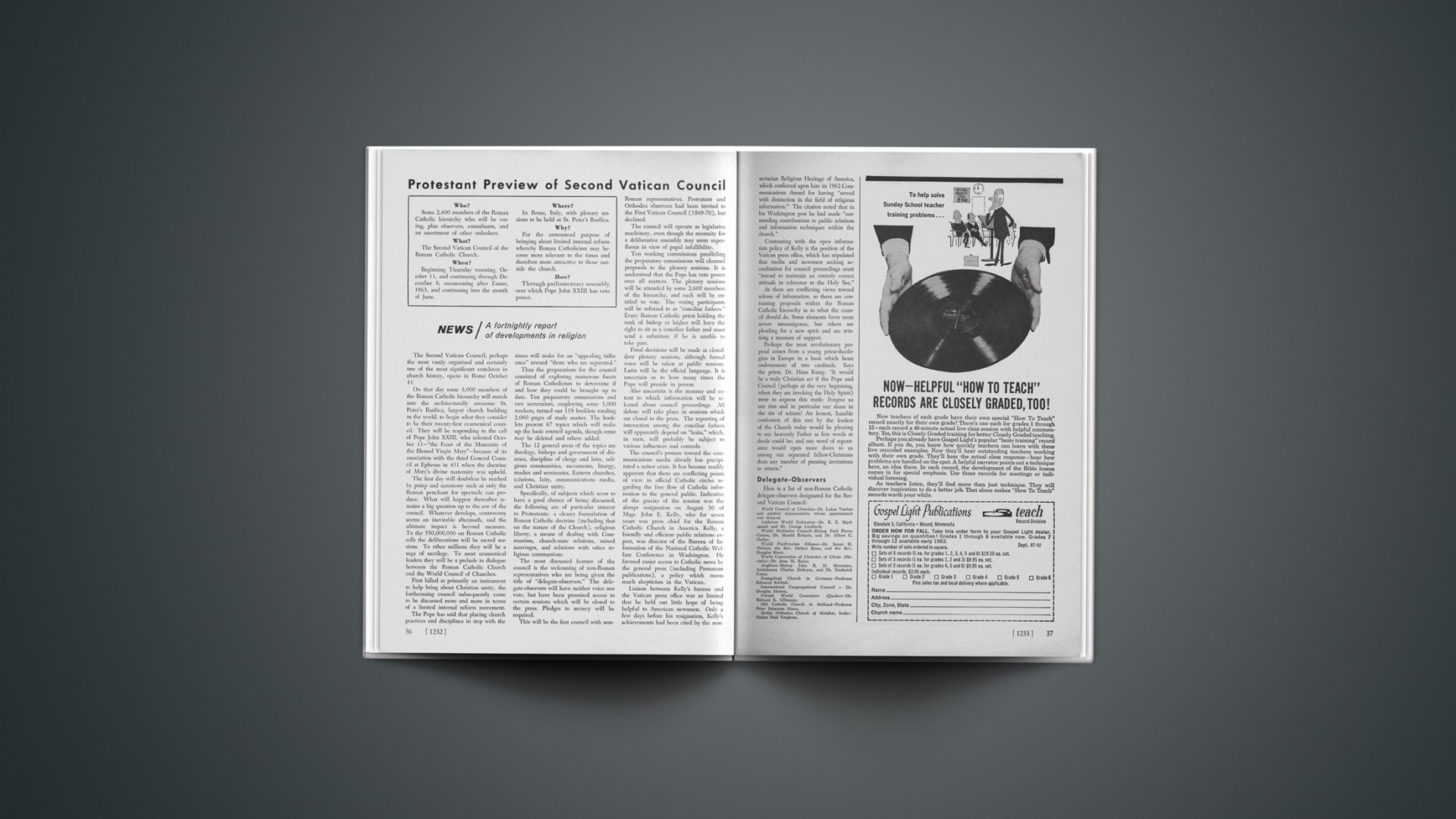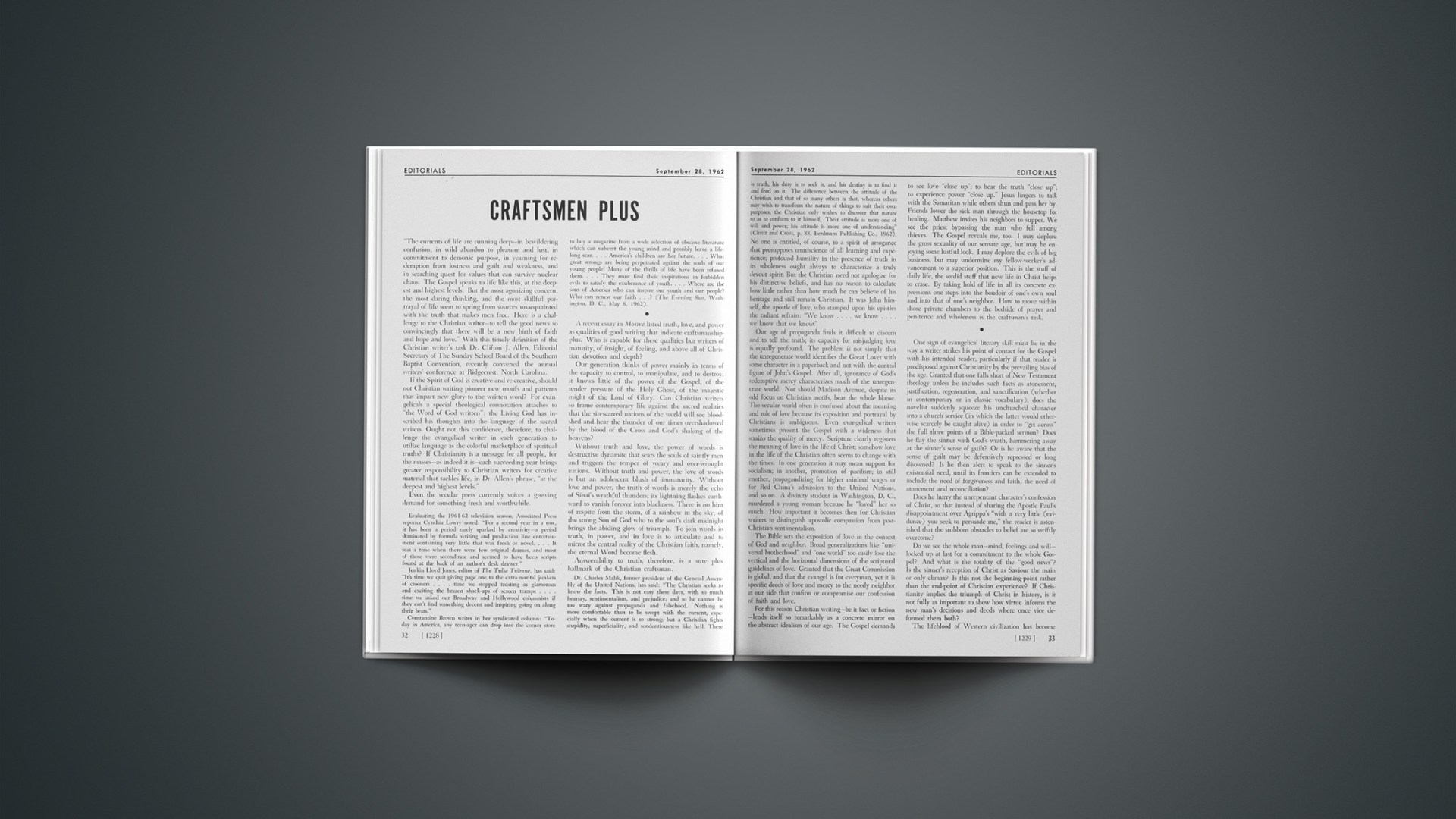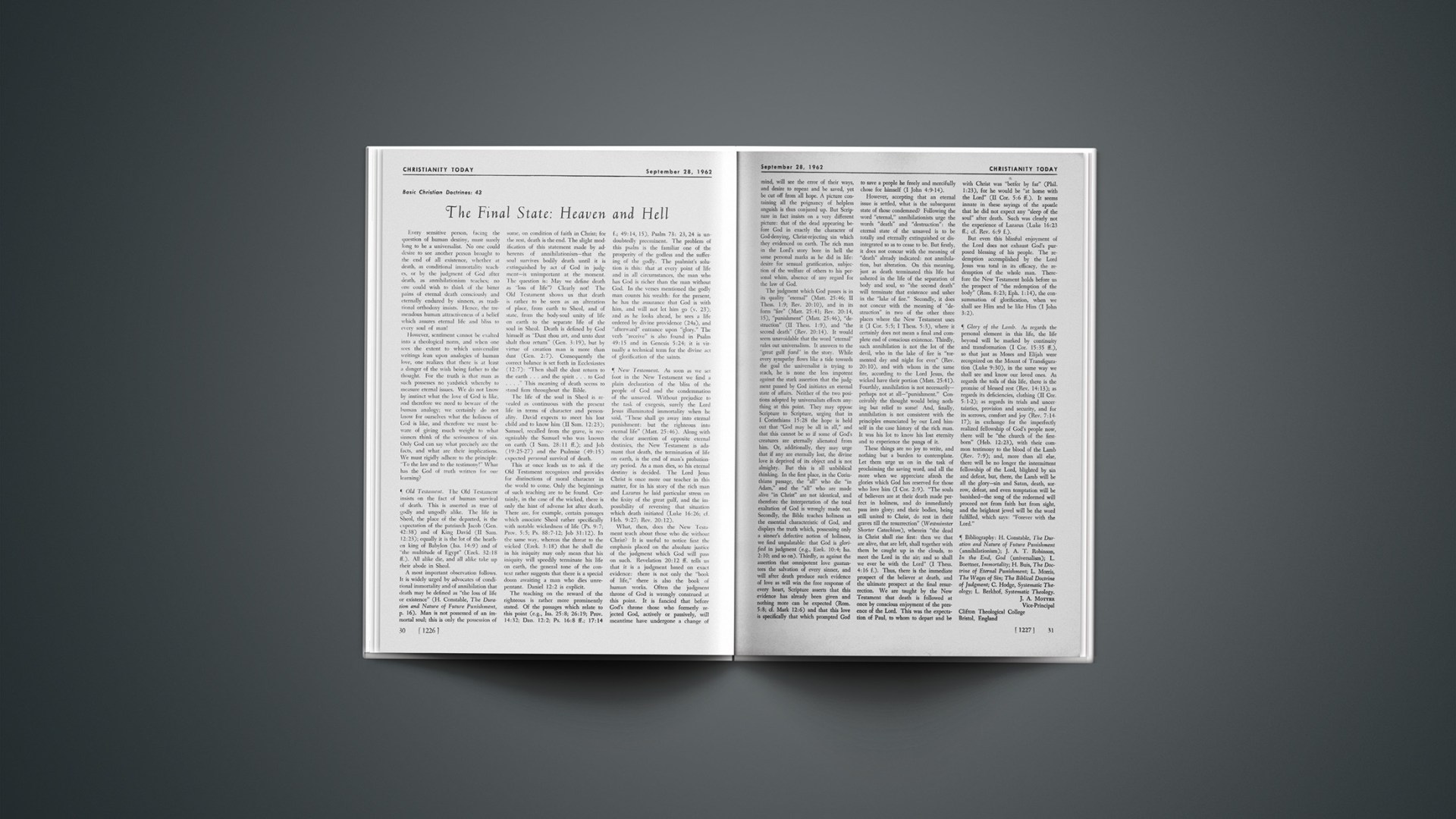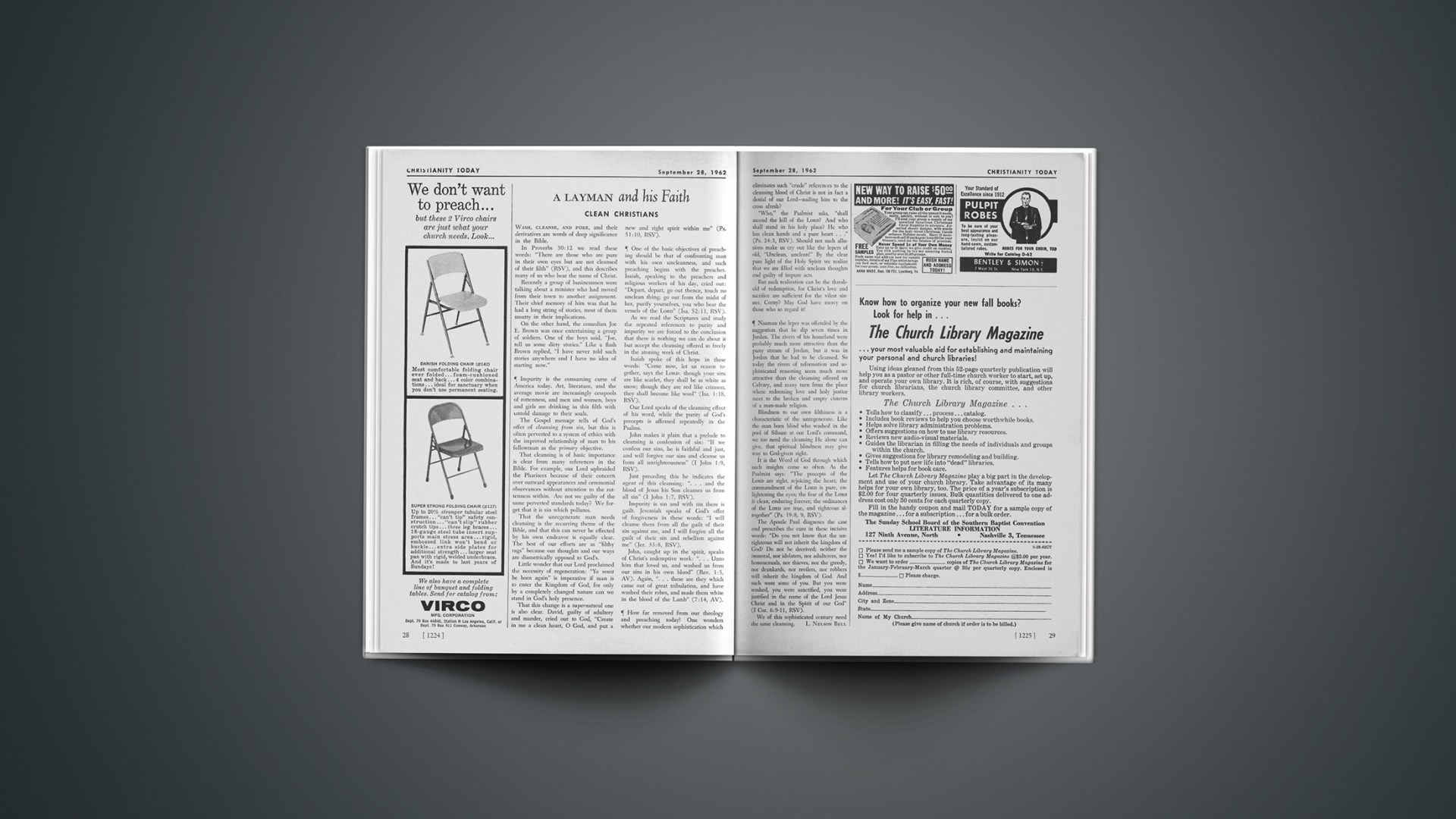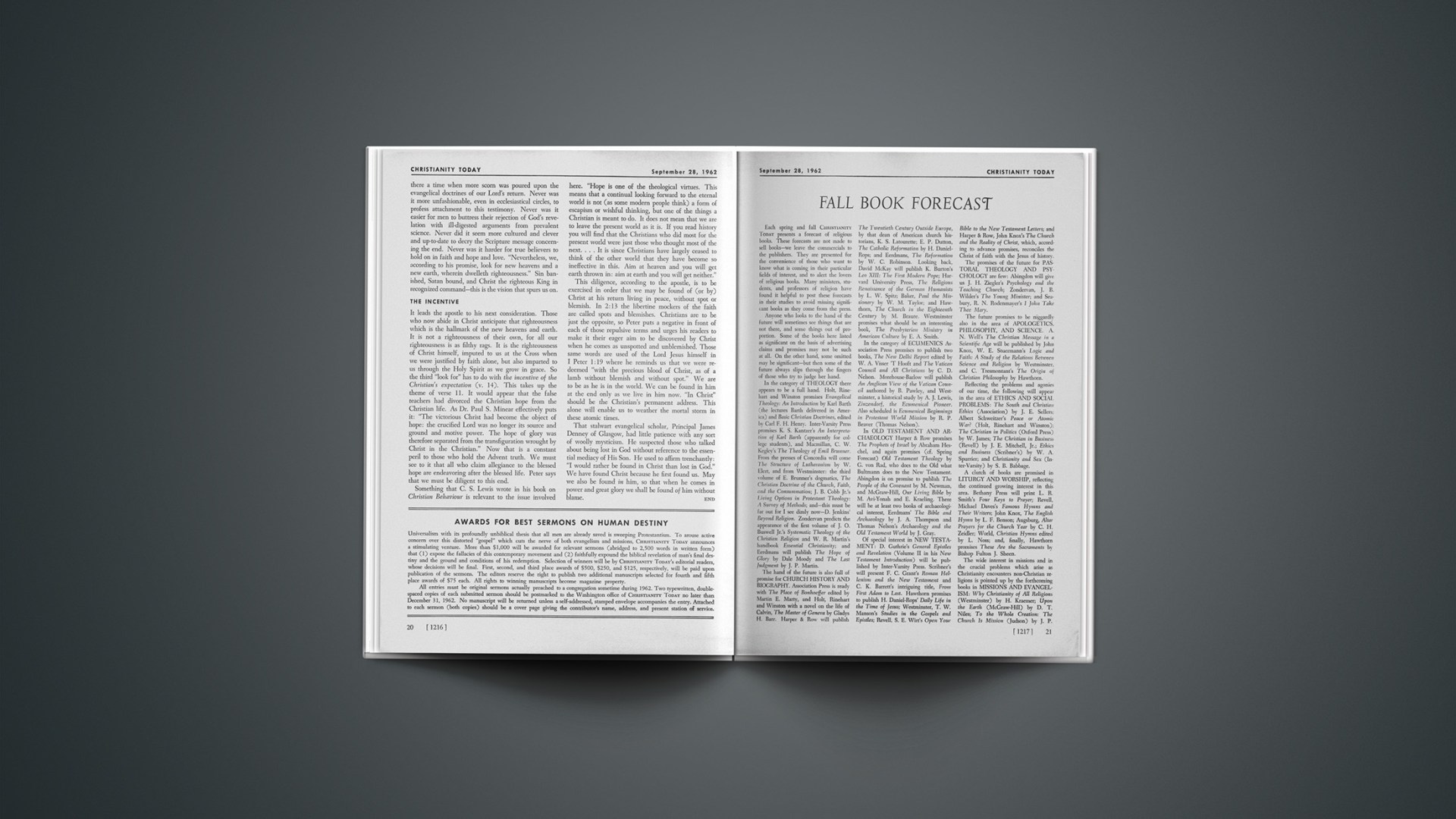October 11, 1962, will be remembered as one of the great days of modern church history. For on this day the “Second Vatican Ecumenical Council,” which, in the terminology of Pope John XXIII (“Discourse on Pentecost,” 1960), has already been at work for years in its “antepreparatory” and “preparatory” phases, enters its third phase, “the celebration of general assembly, the council in its solemnity.” How long this phase, which is to be followed by the fourth stage, “the promulgation of the acts of the council,” may last, no one can predict. Its first period will last until December 8. Since the vast subject matter that has been prepared by the preparatory commissions and handed on to the bishops in a number of volumes cannot be properly dealt with in eight weeks, the council may be called again and again for shorter meetings. Thus it could be that the Second Vatican Council will last as long as those of Basel (1431–49) and Trent (1545–63). All depends on the decisions of future popes—the death of the pope interrupts automatically the ecumenical council—and on the world situation, which may or may not allow the assembling of more than 2,000 bishops in one place.
The council will be an “ecumenical council” in the sense of the Canon Law (CIC can. 222–9) and according to the Roman understanding of the One, Holy, Catholic and Apostolic Church. But will it be really ecumenical? This question is being asked even by theologians who should know that none of the meanings which the word “ecumenical” has accepted in the course of history can claim normative validity. Today “ecumenical” is used in the sense of “interdenominational,” “comprising all or many churches,” “tending towards or promoting the union of all Christians.” This usage seems to be accepted even by Roman Catholic writers today. However, it must not be forgotten that it is quite new. Until recently worldwide denominational organizations regarded themselves as “ecumenical,” as, for example, the “Ecumenical Methodist Conference.” And why not? “Worldwide” is the original meaning of “ecumenical.” And what is an ecumenical council? In what sense was the largest of the ancient synods, Chalcedon in 451, ecumenical? Among the more than 620 participant bishops were two refugees from Africa. Otherwise the West was represented by the two presbyter-legates of Leo of Rome. The second ecumenical council of 381 was a merely Eastern synod. No representative from the West was present, and none had been invited. Yet the council was soon called “ecumenical,” just as the African synod of Carthage of 418—where among the 200 bishops there were some guests from Spain—called itself a “universal council.” Such words are used as titles of honor rather than in verbal meaning, just as the incumbent of the See of Constantinople bears the title of an “Ecumenical Patriarch,” whatever that may mean.
Discussing the nature of ecumenicity in view of the forthcoming council, the Romanian Orthodox theologian G. Racoveanu states on behalf of his church that the ecumenicity of a council does not depend on the number of bishops participating or on the participation of all churches or of bishops from all churches. He comes to the conclusion: “The ecumenicity of a council is determined by the fact that the episcopate of the Church of Christ recognizes its decrees as infallible. Ecumenicity means infallibility” (Lumière et Vie, No. 45, 1959, pp. 124–45). The idea of modern Protestants that an ecumenical council would be a council in which all churches which claim the name Christian would be free to take part with equal rights irrespective of their confessions must seem grotesque to Catholic Christians of all ages. It would have been strongly repudiated also by the churches of the Reformation. A synod is always ecclesia repraesentativa, the solemn representation of the church which is united in the one true faith. Only orthodox Christians or churches can take part, not schismatics or heretics (depending on who in a given case may be regarded as orthodox and who not). At the request of Constantine, the “Novatian” bishop of Byzantium—which was soon to become Constantinople, the first Christian city and capital of the Empire—took part in the synod of Nicaea. He was, of course, not one of “the 318 fathers” but a guest only, an observer as we would say. The emperor envisaged the “reunion” of that thoroughly orthodox church body with the “great church,” at least in his city. But no union negotiations were held. The attempt of Constantine to persuade Acesius to give up the “schism” in view of the full communion of faith that existed between both parties failed. The various parties had been invited and discussed doctrinal differences. But as soon as the opponents to the homoousion were shown to be heretics, they were excommunicated.
At the great Reformed Synod of Dort in 1618/19 the Arminians took part as members of the Reformed Church of the Netherlands. As soon as their heresy was recognized they were excommunicated with the famous words: “Go, go, you are dismissed.” Churches that are divided in faith can and should meet in conference. Their theologians may and should meet for colloquies. If conferences and colloquies lead to unity, then the uniting churches can meet in synod. A synod can express the existing unity, but it cannot negotiate reunion. This is borne out by the failures of the attempts of the synods of Lyons (1274) and Florence (1439) to reunite East and West. Strange as it may seem to modern man, and even to modern Christians, the idea of a synod, and especially an ecumenical synod, is closely bound up with the distinction between truth and error, pure doctrine and false doctrine, Church and heresy. This is so because already in the New Testament the Church cannot be understood without an understanding of heresy as that which claims to be Church, but is not Church.
Significance For Modern Protestantism
The great significance of the Second Vatican Council for Christendom as a whole and especially for the modern Protestant churches must primarily be seen in the fact that this council, as no other event in modern church history has done, calls us to a new understanding of dogma for the Church. This will become very evident when on October 11 more than 2,000 bishops confess the Nicene Creed, not as a beautiful liturgical formula, a venerable document of the past, but as the confession of the truth which they must defend with their lives and for which they are prepared to shed their blood, as probably a number of them will do. They confess it as the great ecumenical creed which does not belong to the Roman Church only, but which is the common possession of East and West (despite the controversy about the filioque), of Rome and the churches of the Reformation. Why is such a confession impossible at a full assembly of the World Council of Churches? It is worthwhile to ponder this question. The two great councils will stand during the coming years side by side, the Ecumenical Council of the Vatican and the World Council of Churches (which in some countries, e.g., Germany, is also called “Ecumenical Council”), both claiming to represent the true ecumenicity of the Church of Christ. Living Christian faith and faithful confession unto death are not the special privilege of Rome. Martyrs will die in all churches. The persecutors make no distinction.
Why, then, is it impossible for the World Council also to confess the great ecumenical creed? The simple, though terribly sad, answer is: These 200 churches and sects have no longer a common creed, because they have no common faith. There are the Eastern Orthodox churches which have preserved the old faith and would never allow one iota to be taken away from that faith which they confess in the Nicene Creed. There are the Lutheran churches within the WCC which claim to maintain not only the ancient creeds, but also the confessions of the Reformation which are based on the old creeds. There are the Anglican churches which do no longer know whether they can confess anything beyond the ancient creeds. There are the Presbyterian and Reformed churches, the majority of which have deprived their old confessions of their binding force and are looking for a new confession. There are the creedless churches of Western Protestantism, and also the liberals in all churches mentioned who claim that “reasonable liberty of interpretation” which robs the creed of its content and the act of confession of its seriousness. There is the fateful heritage of the eighteenth century, pietism, which wipes out the border between Church and heresy, and rationalism, which replaces Christianity by a “religion in which we all agree.” There are the “younger churches” which are told by their missionaries that the Nicene Creed is Western theology (whereas in reality its content is biblical and natives from Asia and Egypt formulated it) and that they must make a better one, perhaps after the pattern of “Barmen.” How out of this chaos of churches, sects, theological schools, and personal opinions can the voice of the Una Sancta be heard—which until the end of the world will confess what the Nicene Creed confesses about the one God the Father, the one Lord Jesus Christ, the Holy Spirit, the one Church, and the one Baptism? This is impossible.
It has been said that the WCC as a council of churches cannot do what the individual church can, namely, confess its creed. This is only partly true. First of all, is not the weakness of the WCC the weakness of its members? How many of these churches, with the exception of the Eastern Orthodox, can today clearly say what they believe, teach, and confess? Secondly, every council of churches must have, and actually has, a doctrinal basis. Even the WCC cannot accept any community that claims to be Church of Christ. It makes practically its own distinction between Church and heresy if it is not prepared to accept the “Church of Jesus Christ of Latter-Day Saints,” the Christadelphians, Jehovah’s Witnesses, and professedly Unitarian churches. It must, therefore, define certain minimum requirements in its basis, which now reads: “The [WCC] is a fellowship of churches which confess the Lord Jesus Christ as God and Savior according to the Scriptures and therefore seek to fulfill their common calling to the glory of the one God, Father, Son and Holy Spirit.” One must compare this clever product of modern ecumenical diplomacy with the clear, unambiguous, and sincere statements of the Church of former times. Lutherans had missed in the earlier basis a reference to the authority of Holy Scripture as the sole source and norm of doctrine. For this reason let us include “according to the Scriptures.” This must be acceptable to the Orthodox churches, for it comes from the Nicene Creed. There, of course, it has a clear specific meaning, being quoted from 1 Corinthians 15. Here it can be understood—and is understood, as the comments published show—either in the sense in which Holy Writ is the authority for Catholics or for adherents of the Reformation, for orthodox Protestants or for modernists. It has been welcomed even by such who reject any creedal statements. Eastern Orthodox critics had missed a statement on the Trinity. So let us put in after “seek to fulfill their common calling” (whatever that may mean according to the social or another gospel): “to the glory of the one God, Father, Son and Holy Spirit.” Either this phrase is a mere doxological formula which even the most modernist American bishop can sing with a good conscience, or the words mean what they say. Then it could as well be stated that these churches confess the Trinitarian faith in the sense of “one substance, three persons.” But this would be unacceptable to many, if not most, of the Protestant member churches.
The whole tragedy of modern Christendom here becomes obvious, the loss of the doctrinal substance and the consequent inability to confess the Christian faith. How clear, indeed, are the doctrinal statements of the ancient Church and of the churches of the Reformation. But the Church at those times confessed its faith “in the presence of God and of the whole Church” of all ages and in view of the coming judgment of God (conclusion of the Formula of Concord). To find such sincerity, one must today go to Rome. The decrees of the new council will not be ambiguous. They will mean what they say. They will not be made by theological dilettantes, but by men who know the Scriptures and the doctrines of the Fathers, by men who know Greek and Latin and understand the terms they use. They will be accepted by men who know that they will have to answer for them in the Last Judgment. Therefore, these decrees will have authority. Who still knows today the solemn declarations made by the ecumenical conferences from Stockholm and Lausanne to Evanston and New Delhi? The decrees of the Vatican Council, whatever their content may be, will belong to the elements of theological education even in the non-Roman churches.
Perhaps nothing less than an ecumenical council summoned by the pope was necessary to wake our sleeping churches from their ecumenical dreams. What neither Luther nor Calvin was able to do when their theology was revived after the First World War, what neither Barth, nor the confessional, nor the neoorthodox nor the biblical theology of the last generation could achieve, this perhaps John XXIII and his ecumenical council will achieve. The dogmatic decrees of the council will compel us to think again in terms of dogma. Our encounter with the living Roman dogma will be of the mightiest sort of challenge to us. We shall again understand that Christianity without firm convictions must degenerate, even morally, because it makes hypocrites of those of us who pretend to convictions which we do not possess, as for example when we sign confessions which we do not even properly know or which we accept with a “reasonable liberty of interpretation.” “Tolle assertiones et tulisti Christianismum,” says Luther against Erasmus. “Take away the firm doctrinal statements, and you have abolished Christianity.” And this council may help us to overcome the worst of all superstitions in the Church, the belief in bigness, in the great numbers, in the stronger battalions of the ecclesia militans, as if our Lord had said: “Where two or three millions are gathered in my name, there I am in the midst of them.” To relieve us from such dreams may be the blessing of the council for us.
Significance For Roman Catholicism
And what will be the significance for the Roman Church? Judging from the work of the preparatory commissions, not one stone will be unturned in the vast structure of the Roman Church. Church law (e.g., renewal of the episcopate as ruling the church with the pope) and liturgy (e.g., the possibilities of the use of the vernacular in the mass), clergy (training, life, discipline, celibacy, the new office of the deacon) and laity (functions and offices), administration of the church on all levels, missions and education, the sacraments (including the marriage law), and numerous other practical subjects will come up for decisions.
The great dogmatic issues that grow out of the heritage from the First Vatican Council are the sources of revelation, the doctrine of the Church, and Mariology. The First Vaticanum finished two doctrinal constitutions, the Constitutio on the Catholic Faith, and the First Constitution on the Church of Christ. The former establishes the doctrine of natural revelation (God the Creator and Lord can with certitude be recognized by the natural light of reason) and reaffirms the doctrine of Trent on the sources of supernatural revelation. In this context the doctrine of the inspiration of Scripture is developed. The present problems to be decided are the reconciliation of the doctrine of the inspiration and inerrancy of the Scriptures with the methods and results of “higher criticism,” which was recognized in the Bible encyclical of 1943, and the relationship between Scripture and tradition (can tradition be a source of doctrine apart from Scripture?). The doctrine of the Church was the second great problem in 1870. The draft of an elaborate constitutio on the Church had to be shelved, partly because the shortage of time allowed the council to finish only the doctrine of the papacy, partly because the time was not ripe to decide the great problems of ecclesiology. This will be the foremost dogmatic task of the new council.
It is the greatest doctrinal decision since the Reformation, a decision that must be made by all churches of Christendom and therefore something which must cause them to consult each other, to learn from each other, and to warn each other. It is a really ecumenical problem, the great problem behind the ecumenical movements of our time. As Christendom in the sixteenth century had to answer the question, what do we mean when we confess in the creed that the Son of God came from heaven and was made man “for us men and for our salvation,” so we all have to say what we mean when we confess our belief in the one holy Catholic and Apostolic Church. As at that time the epistles to the Romans and the Galatians were understood as never before, so today we have to say what the great texts of the New Testament which deal with the Church mean. The Reformers for the first time had to say what the Church is when they found themselves excommunicated by Rome. All confessions since the Augustana of 1530 did that. They all started with the concept of the Church as the assembly of the believers, the people of God. Trent did not take up the subject, but the Catechismus Romanus of 1566 had to expound the Apostles’ Creed and to explain what it says on the Church. It started also with the concept of the Church as assembly, as the people of God. This is the proper way, for this is the meaning of the word ekklesia in the New Testament. From this definition one must go on to what the New Testament says about the Church as body of Christ, as bride of Christ, and so on.
When the fathers of the Vatican Council in 1870 looked into the proposed constitution on the Church, they found that this started with the definition of the Church as the body of Christ and proceeded from there to the Church as the people of God. Soon a great discussion was on, and it became obvious that many bishops could not accept that. At first sight it seems to be an insignificant question. But behind it looms a serious problem. If the Church is the people of God as she speaks of herself in the liturgy, then she can be and is not sinless, but prays for forgiveness, just as God’s people in the Old Testament. If the Church is primarily the body of Christ, Christ living here on earth, the Church as the continuation of the Incarnation, then the Church is sinless. This is not what Paul meant by the profound doctrine of the Church as the body of Christ. But it is the necessary consequence if one makes what to him was the last word on the Church the first. This idea, that the nature of the Church is defined by the term “body of Christ,” has swept through Christendom since the early nineteenth century, in connection with the romantic understanding of human societies as organisms. Until 1943, outstanding Roman theologians rejected this ecclesiology. But the encyclical Mystici Corporis of that year sanctioned it and therefore prejudiced the decision of the council. The Church is sinless, declares Pius XII in that document. If she prays the Fifth Petition, she does so not for herself, but for some of her weak members. Is this the doctrine of the Church which we have to expect from the Second Vatican Council? If the Church is sinless, if she is Christ living on today, then she may be the source of revelation—which actually she has become in the proclamation of the dogmas of the Immaculate Conception and of the Assumption of Mary in 1854 and 1950. Immaculate Mother of God, infallible pope, sinless Church: whither does this lead?
When on October 11 (the feast of the Maternity of Mary) the bishops of the Roman Church enter St. Peter’s for the council which is put under the patronage of St. Joseph, they will pass by the great tablets with the dogma of 1950 and the names of Pius XII and his cardinals. With what resolutions will they enter the council? Some certainly with the firm decision to do all in their power to increase the glory of Mary and Joseph. Others certainly with the resolution to resist anything which might interfere with the honor of Christ as their only redeemer and mediator. Who will prevail we shall know in some years’ time.
We have entered the period of church history which later may be called the time of the Second Vatican Council. What a time of blessing it would be to the whole of Christendom if we all, older and younger churches of West and East, Catholics and Protestants, listened to what the Lord of the Church says to his churches today: “Remember … from whence thou art fallen, and repent, and do the first works; or else I will come unto thee quickly, and will remove thy candlestick out of his place, except thou repent”; and: “Because thou hast kept the word of my patience, I also will keep thee from the hour of temptation, which shall come upon all the world.… He that hath an ear, let him hear what the Spirit saith unto the churches” (Rev. 2:5; 3:10, 13).
END

